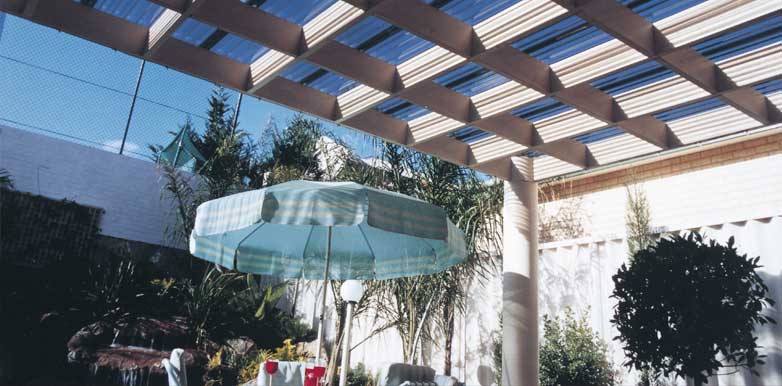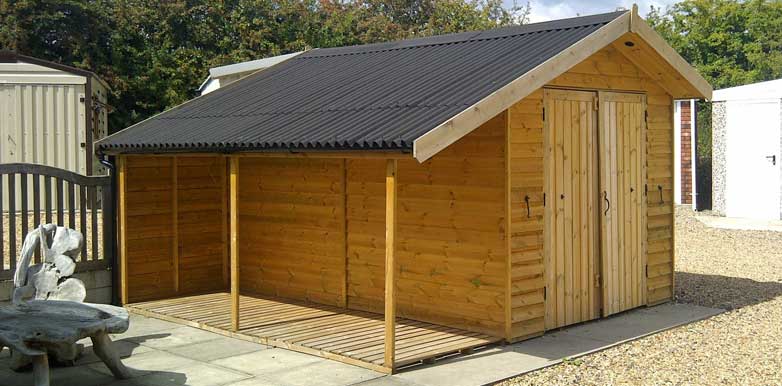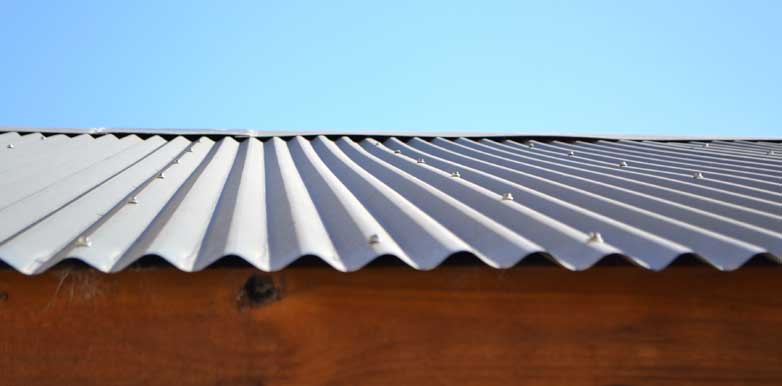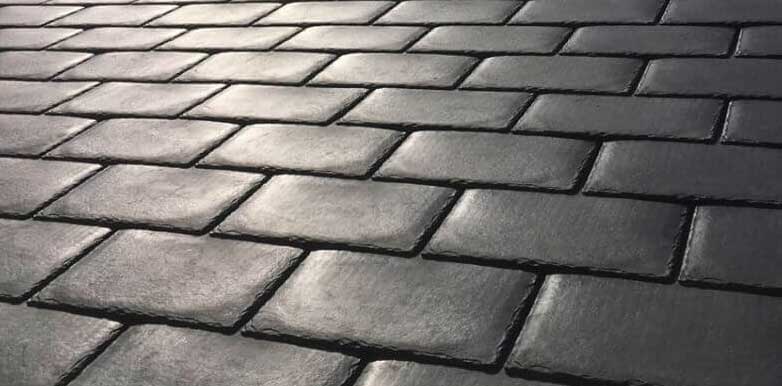The Best Lean-To Roofing Materials
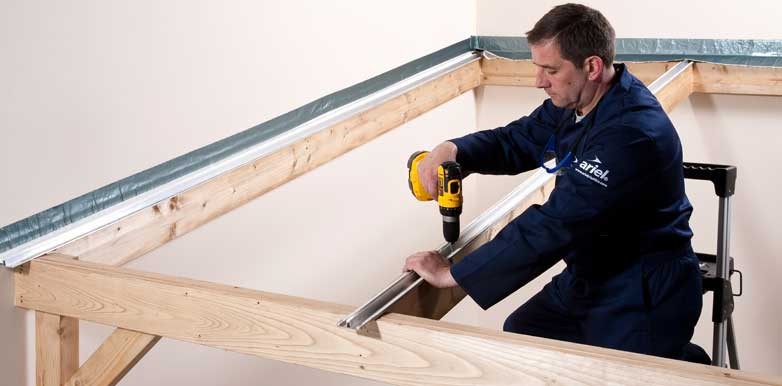
Lean-tos can be seen in use across the whole of the UK. Defined as a simplified structure that is attached to an already-existing structure, with this building’s rafters leaning up against a wall of the original property, it is one of the simplest, yet most versatile additions to any home. From conservatories to log shelters, to carports, a lean-to can have endless uses.
But which roofing material is best for your lean-to? With so many options, each varying in size, weight, aesthetics, and price, it can be difficult to decide. Fortunately, this guide is here to help. We’re going to talk you through the positives and negatives of each of the most popular materials, to enable you to make the right decision for your lean-to roof.
Best Lean-To Roofing Materials
Polycarbonate Sheets
A very popular material with DIYers, polycarbonate sheeting is manufactured from high-quality plastic making it one of the most versatile and easiest to work with. Most are very simple to install without the need for a specialist kit and can still offer some exceptional protection from the elements.
Polycarbonate tends to act as an alternative to glass glazing, best used for greenhouses, conservatories or any other application where you need or want a lot of natural light. Some leading manufacturers such as Corotherm and Solek have even pushed the boat out a bit further and created UV-resistant variations, meaning that they can maintain their appearance for years without degrading or yellowing.
Typically, when looking at polycarbonate you will have a choice between solid sheets, multi-wall and corrugated. Solid polycarbonate highlights this material's biggest selling point – an impact resistance 200x that of glass.
This makes the sheets shatterproof and thus one of the safest materials you can put on your Lean-to. Multiwall polycarbonate sheets can combine up to seven layers of polycarbonate for increased insulation performance and durability. Corrugated polycarbonate sheets, thanks to their unique design, provide maximum strength and are able to reflect sunlight far more efficiently than many alternatives, preventing heat from getting into or under your Lean-to. All three are incredibly lightweight making transport and installation a breeze and more importantly, saving you precious time.
However, in order to achieve this strength and versatility polycarbonate does not offer the same sparkling finish you might get with glass nor a great variation in colour and design. Despite this, its popularity is rapidly growing making it the norm for contemporary extensions. A straightforward answer to a complex question, it is hard to go wrong with polycarbonate.
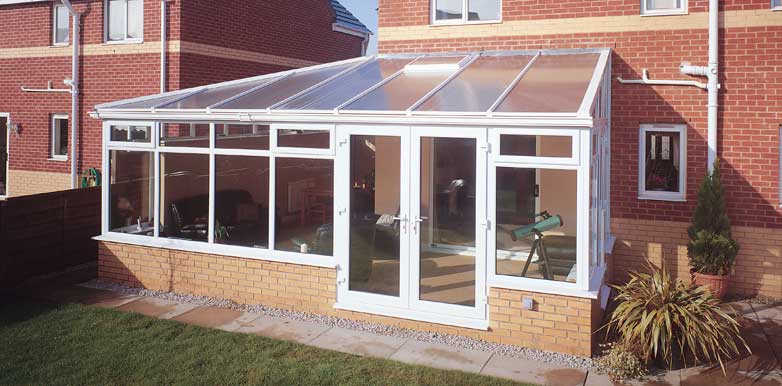
PVC Plastic Sheets
As you would expect, PVC shares a lot of similarities with polycarbonate. It is transparent, exceptionally lightweight and easy to install. It is also far more affordable and, in some cases, can be more scratch resistant, however, this all comes at the price of being significantly weaker than polycarbonate.
To make up for this, a lot of plastic roof sheets are corrugated and as such are unlikely to sag between the frame of your Lean-to. They also aid in collecting and draining excess rainwater. PVC corrugated sheets tend to be available in a very wide range of sizes and dimensions, allowing a great deal of flexibility when ordering and potentially minimising the number of sheets you will need, by extension increase the amount of money you can save.
PVC, therefore, is really best suited for smaller-scale Lean-to’s where strength is potentially less important than your budgetary restrictions.
Bitumen Sheets
Another popular option, installing bitumen sheets is a decade-old tried and tested method of roofing your lean-to and can easily last for twenty years without any serious maintenance required. Like the plastic sheets, it can be fixed very easily and often has purpose made fixings to make the job even simpler. As an asphalt-based product, it can be installed in both low and high temperatures making it an excellent choice for emergency constructions, such as storage buildings during winter months.
A classic material for waterproofing, these sheets overlap with each other during the installation, fully preventing the entry of rain whilst effectively channelling it away from any valuable possessions that may be housed inside your Lean-to.
All in all, bitumen is a utility product. It does a fantastic job at protecting from the elements and is phenomenally convenient, even absorbing heat and acting as insulation. However, because of this focus it can’t be said to be the most stylish looking of materials. Whilst some brands, such as Coroline do offer a range of colours, the overlapping corrugations mean that to achieve a neat roofline a lot of precise measuring is required. Whilst not a deal breaker, this does make bitumen more suited for carports and storage buildings rather than extra living spaces.
Galvanised Steel Sheets
Perhaps the most robust material available to you, metal roofing sheets provide a near-perfect balance between durable protection and strong visual appeal. An ideal choice for any number of applications, metal brings along with it a level of reliability making it suitable for a roof that can be used to protect anything from cars to logs to garden equipment.
The material itself can vary from brand to brand, but most commonly will be manufactured from steel both standard and galvanised. They are available in varying sizes and styles to help you find the best product to suit your specific project. This includes a potential choice of either a PVC or polyester coating which can add an additional 25 years of protection to an already impressive lifespan. Metal is best used for new Lean-to’s that you intend to use for many years to come.
Synthetic Tiles
The one thing that every material on this list so far has in common is that they force you to go against the aesthetic of your home. There is good reason for this as most common roofing materials, such as tiles and slates, are simply too heavy or too expensive for feasible use on a Lean-to. Or at least they used to be.
Purpose made to provide that sought-after traditional appearance, synthetic slate tiles allow you to cover your lean-to whilst matching the style of your roof, making for a seamless and sometimes continuous looking roofline. Produced with the flexibility to be installed on lower pitched roofs, these tiles like all the alternatives can also be installed quickly making them perfect, not only for stylish Lean-to’s but also your houses roof as well.
With revolutionary new designs synthetic tiles once thought to be weaker than the clay models they imitate have now been proven to be just as strong and protective with the added benefit of being far lighter and cheaper. Some brands, such as Envirotile have even started producing tiles made from environmentally friendly waste, allowing homeowners to combine style with sustainability.
Of course, they are not perfect and like any tile can sustain damage from particularly violent weather. Although, they are far easier to replace and, if recent years are any indication, are likely to become more and more durable as the years pass.
The Best Lean-to Roof for You?
Whilst not the most satisfying answer, this depends entirely on what your Lean-to is for and what features you want to prioritise. For extensions storing valuable equipment, corrugated bitumen or metal will be the best choice. If you just want somewhere to enjoy the sunshine under cover or perhaps a nice conservatory, Polycarbonate, PVC or glass are ideal. For a structure you want to match to the rest of your house, go synthetic. It all depends on your personal preferences and budget.
Whatever you decide, you'll be sure to find a fantastic selection of lean-to roofing options here at Roofing Megastore.
